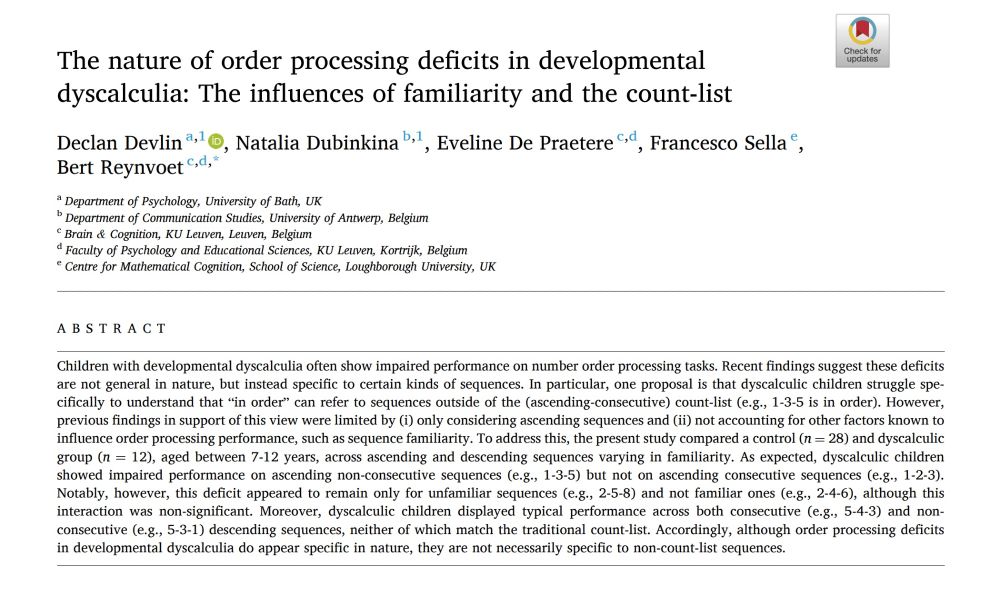
For the fandom: I love seeing your content, but I will not be posting.
nyaspubs.onlinelibrary.wiley.com/doi/pdfdirec...
nyaspubs.onlinelibrary.wiley.com/doi/pdfdirec...
Across 473 participants, we found no sex differences in implicit statistical learning — a core mechanism of predictive processing.
The predictive brain appears remarkably universal.
doi.org/10.1101/2025...
#neuroscience
#learning
#PsychSciSky
#neuroskyence

Across 473 participants, we found no sex differences in implicit statistical learning — a core mechanism of predictive processing.
The predictive brain appears remarkably universal.
doi.org/10.1101/2025...
#neuroscience
#learning
#PsychSciSky
#neuroskyence
Our team shows that statistical learning & inhibitory control cooperate during behavior.
A flexible brain optimizes both automatic & controlled processes together - not either/or.
Preprint:Cooperative interaction between statistical learning and inhibitory control
doi.org/10.31234/osf...
Our team shows that statistical learning & inhibitory control cooperate during behavior.
A flexible brain optimizes both automatic & controlled processes together - not either/or.
Preprint:Cooperative interaction between statistical learning and inhibitory control
doi.org/10.31234/osf...
Shared first-authorship w/ Dr. Natalia Dubinkina!
Open access: doi.org/10.1016/j.je...

Shared first-authorship w/ Dr. Natalia Dubinkina!
Open access: doi.org/10.1016/j.je...
ADHD-like traits don’t just affect inhibition or learning — they reshape their interaction.
A key problem in neuroscience is studying functions in isolation, but cognition emerges from their interplay.
doi.org/10.1101/2025...
#neuroscience
#learning
#PsychSciSky
#neuroskyence

ADHD-like traits don’t just affect inhibition or learning — they reshape their interaction.
A key problem in neuroscience is studying functions in isolation, but cognition emerges from their interplay.
doi.org/10.1101/2025...
#neuroscience
#learning
#PsychSciSky
#neuroskyence
People who experienced more childhood unpredictability show faster implicit statistical learning in adulthood.
Supports the “hidden talents” view of adversity.
Read here 👉 doi.org/10.1101/2025...
#neuroscience
#learning
#PsychSciSky
#neuroskyence

People who experienced more childhood unpredictability show faster implicit statistical learning in adulthood.
Supports the “hidden talents” view of adversity.
Read here 👉 doi.org/10.1101/2025...
#neuroscience
#learning
#PsychSciSky
#neuroskyence
doi.org/10.1038/s415...
#Autism #Learning #StatisticalLearning

doi.org/10.1038/s415...
#Autism #Learning #StatisticalLearning
How do executive functions shape our ability to rewire habits / update predictive models?
✔️ Better inhibition = easier habit change
❌ Strong semantic fluency = harder to update old patterns because of the long-term memory access.
doi.org/10.1038/s415...

How do executive functions shape our ability to rewire habits / update predictive models?
✔️ Better inhibition = easier habit change
❌ Strong semantic fluency = harder to update old patterns because of the long-term memory access.
doi.org/10.1038/s415...
improvingpsych.org/2025/08/20/c...

improvingpsych.org/2025/08/20/c...
We go beyond studying goal-directed & habitual control in isolation — using an unsupervised learning approach to see how they interact.
OC tendencies tip the balance toward rigid habits over flexible goals.
doi.org/10.1101/2025...
#OCD #PsychSciSky
#StatsSky
#neuroskyence

We go beyond studying goal-directed & habitual control in isolation — using an unsupervised learning approach to see how they interact.
OC tendencies tip the balance toward rigid habits over flexible goals.
doi.org/10.1101/2025...
#OCD #PsychSciSky
#StatsSky
#neuroskyence
www.scientificamerican.com/article/when...

www.psychologytoday.com/us/blog/expe...
#predictiveprocessing #Neuroscience #statisticallearning #cognition

www.psychologytoday.com/us/blog/expe...
#predictiveprocessing #Neuroscience #statisticallearning #cognition
How does the brain retrieve probabilistic representations? Can we enhance this process? Our latest study says yes! We show that DLPFC intervention improves access to representations built up through statistical learning.
doi.org/10.1093/cerc...
#PsychSciSky
#neuroskyence
#neuroscience

How does the brain retrieve probabilistic representations? Can we enhance this process? Our latest study says yes! We show that DLPFC intervention improves access to representations built up through statistical learning.
doi.org/10.1093/cerc...
#PsychSciSky
#neuroskyence
#neuroscience
www.cell.com/iscience/ful...

www.cell.com/iscience/ful...
So, who is coming to #SIPS2025?
Don't miss it! It will be the 10th SIPS, so we will come together to evaluate the reform and gather new momentum to improve science.
Day 0: Sightseeing, hiking
dinner: on a boat on the Danube
Let others know that you are coming to Budapest so they can meet you!

So, who is coming to #SIPS2025?
Don't miss it! It will be the 10th SIPS, so we will come together to evaluate the reform and gather new momentum to improve science.
Day 0: Sightseeing, hiking
dinner: on a boat on the Danube
Let others know that you are coming to Budapest so they can meet you!
Register and join us this Wednesday in the #SIPS Early-reformers discussion where I will chat with Simine Vazire, Brian Nosek, Dorothy Bishop, Joe Simmons, and Leif Nelson about these questions.
bsky.app/profile/impr...

Register and join us this Wednesday in the #SIPS Early-reformers discussion where I will chat with Simine Vazire, Brian Nosek, Dorothy Bishop, Joe Simmons, and Leif Nelson about these questions.
bsky.app/profile/impr...
osf.io/preprints/os...
#PsychSciSky
#metasci
#StatsSky
#sleepscience
#sleepresearch
#neuroskyence
osf.io/preprints/os...
#PsychSciSky
#metasci
#StatsSky
#sleepscience
#sleepresearch
#neuroskyence
We investigated memory consolidation processes in autism and neurotypicals with autism traits.
www.sciencedirect.com/science/arti...
We investigated memory consolidation processes in autism and neurotypicals with autism traits.
www.sciencedirect.com/science/arti...
bmcpsychiatry.biomedcentral.com/articles/10....

bmcpsychiatry.biomedcentral.com/articles/10....
www.sciencedirect.com/science/arti...

www.sciencedirect.com/science/arti...
osf.io/preprints/ps...
osf.io/preprints/ps...

